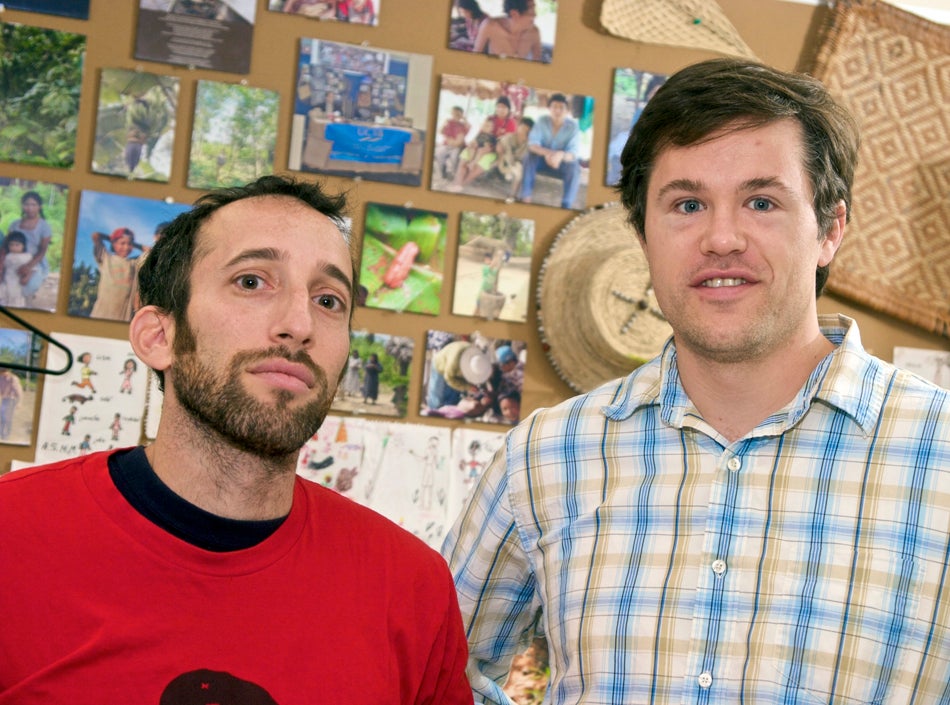
Across human societies –– including our own –– men often devote a great deal of time and effort to increasing their social status and displaying their success publicly through material possessions or by showing off particular skills.
Two anthropologists at UC Santa Barbara are studying this phenomenon and how social status translates into fertility. Their findings appear in an article in the current issue of the Proceedings of the Royal Society B. According to the researchers, the most significant variables connecting a man's social status to his reproductive success are the opportunity it affords him to marry a younger wife, and his ability to recruit allies and cooperative partners. The younger his wife, and the more social support he garners for either conflicts or food production, the more surviving offspring a man will have, the anthropologists conclude.
The article, "Why Do Men Seek Status? Fitness Payoffs to Dominance and Prestige," was co-authored by Christopher von Rueden, a doctoral student in anthropology at UCSB; Michael Gurven, associate professor of anthropology at UCSB; and Hillard Kaplan, professor of anthropology at the University of New Mexico.
"In evolutionary anthropology, we evaluate the ‘success' of traits and behaviors in terms of their effects on fitness –– by surviving, reproducing, and by having children who both survive and reproduce," said von Rueden, the paper's lead author. "If, over multiple generations, a certain behavior consistently led to higher average fitness outcomes, there should be selection for that behavior. Although status isn't something you can impact so easily. Some people are born with greater advantages –– whether it's physical size, a larger kin network, or a charming and persuasive personality."
Focusing their investigation on the Tsimane, a small-scale Amerindian society in central Bolivia, the researchers sought to determine which of two measures of social status –– dominance or prestige –– resulted in greater reproductive benefits. "Who has higher fertility and more surviving offspring –– the aggressive bully or the charming Statesman?" von Rueden asked. "And then, I wanted to study the mechanism –– how you get from status to a greater number of surviving offspring."
The researchers examined four different pathways to increased fertility. Among them were the number of mating partners; the quality of mating partners –– their youth, fecundity, and the kin and allies they brought to the relationship; the number of cooperative partners within the community; and deference from competitors. "If you had more prestige in the community, you had more surviving offspring," von Rueden said. "And the biggest predictors of that –– the strongest linking variables –– were that you were able to marry at a younger age to a younger wife, and you could rely on more allies and cooperative partners."
According to von Rueden, the anthropologists' systematic investigation of the potential mediators of the relationship between the different forms of status and surviving offspring constitutes entirely new research. Previous studies have examined the relationship between, say, hunting ability and surviving offspring in some smaller-scale societies –– or wealth and surviving offspring –– but they haven't always looked at the possible intermediary pathways between those variables. Neither have they considered status per se. "If you're a good hunter, or you have a lot of wealth, it doesn't necessarily mean you have status," he said. "They might get you status and influence in the community, but they aren't direct measures of it."
Because the Tsimane are forager-horticulturists, their society is relatively egalitarian; therefore, one might expect that status would not matter much, when compared to stratified, hierarchical societies where wealth is accumulated in the hands of the few. However, the researchers found this wasn't the case. They focused their research exclusively on Tsimane men because, in this particular society, women tend to be shy and cautious around men to whom they are not related. "Being a 30-year-old man interviewing Tsimane women is a little difficult," von Rueden said. "It presents a limitation. But I do have colleagues who are investigating women's social relationships and social status, which merit as much attention as those of men."
Related Links



